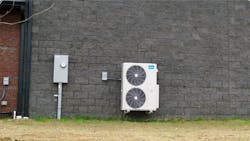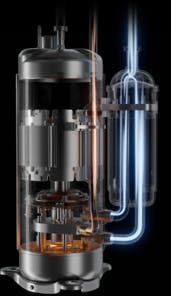Leveraging Residential Multi-Zone Inverter Tech for Light Commercial Use
By DAVID RAMES, Senior Product Manager, Midea America Corp.
HPAC engineers wear many hats when it comes to the heating and cooling of a commercial or industrial building. From planning an HVAC system layout to installation and follow-up services like repairs and inspections, the design and function of the equipment chosen for each project will play a major role throughout the lifespan of a system.
Today, as the HVACR industry enters a new era of legislation and consumer preferences, energy efficiency and sustainability are emerging as a top priority. However, cost savings will forever remain a critical component to any project proposal, as well as customer satisfaction. Inverter heat pump technology checks both boxes while boasting design features that advance the comfort of a building and increase the ease of installation.
Heat pumps have existed for years in residential applications, however recent strides in technology make today’s most innovative residential models an attractive option for light commercial and industrial use.
This comes at a pivotal moment where HVAC engineers are looking to integrate energy efficiency into their system layouts and are being encouraged to wean the industry off fossil fuels. Inverter technology, cold climate heat pumps offer premium energy savings throughout all peak-usage seasons, functioning as both air conditioners in the summertime and heaters in cooler months.
This next generation of heat pump compressor technology runs on variable speeds to use the minimum amount of energy required to maintain consistent comfort for temperature and humidity, while featuring ultra-quiet operation. Because of their efficiency, cost and longevity, commercial property owners and building managers might want to consider leveraging multiple residential heat pumps rather than one commercial unit.
Consider an office building built 10 to 20 years ago with one 20-ton unit on its roof. On hot days, the compressor will run periodically to condition inside air to a set temperature. The unit shuts off at the desired temperature, then turns back on once the inside temperature rises. The system is loud and unpredictable, disrupting the work environment. ‘Off’ periods yield spikes in temperature and humidity, and the constant on/off cycling generates a surplus of wasted energy.
Now consider the same office space integrated with multiple 5-ton inverter technology heat pumps – which have higher SEER (Seasonal Energy Efficiency Ratio) ratings to begin with – along with an indoor air handling unit (AHU) working in tandem with custom selected multi-split heads. This space has now completely transformed in terms of widespread comfort, better and more consistent humidity control, longer unit life (20 years versus 10 as the AHU is located within the conditioned space of the building versus being exposed to the elements on the roof), fewer roof penetrations and increased energy efficiency, all leading to lower utility bills and long-term costs.
With the ability to feature multiple thermostats and zones to offer tailored control to rooms with different purposes, such as storage rooms, conference rooms, and offices. Advanced multizone cold climate heat pump systems with inverter technology are offering engineers and contractors an alternative to typical commercial HVAC solutions.
With this in mind, Midea recently introduced its EVOX Multi-Zone System in the United States featuring a line of inverter technology heat pumps. Designed specifically with HVAC engineers, technicians, and building owners in mind, this system provides flexible and affordable product and system combinations that can seamlessly mix and match ducted and ductless configurations across multiple applications with up to five zones per heat pump. Due to its flexibility in single or multi-zone applications, the system also works in any floor plan. While the EVOX is not the first inverter technology heat pump system on the U.S. market, its suite of products is among the most efficient and easiest for HVAC engineers to integrate into their planning.
In light commercial applications, multiple 5-ton residential heat pumps could replace single large rooftop units. When coupled with a mix of EVOX AHUs and ductless indoor units, the multi-split configuration offers a more versatile multi-zone system to maximize comfort, promote energy savings and reduce costs.
The upfront cost of switching to a high-quality inverter technology heat pump system will pay off quickly as energy bills decrease and happy customers return – all while contributing to an energy transition that will benefit our planet.
##########

